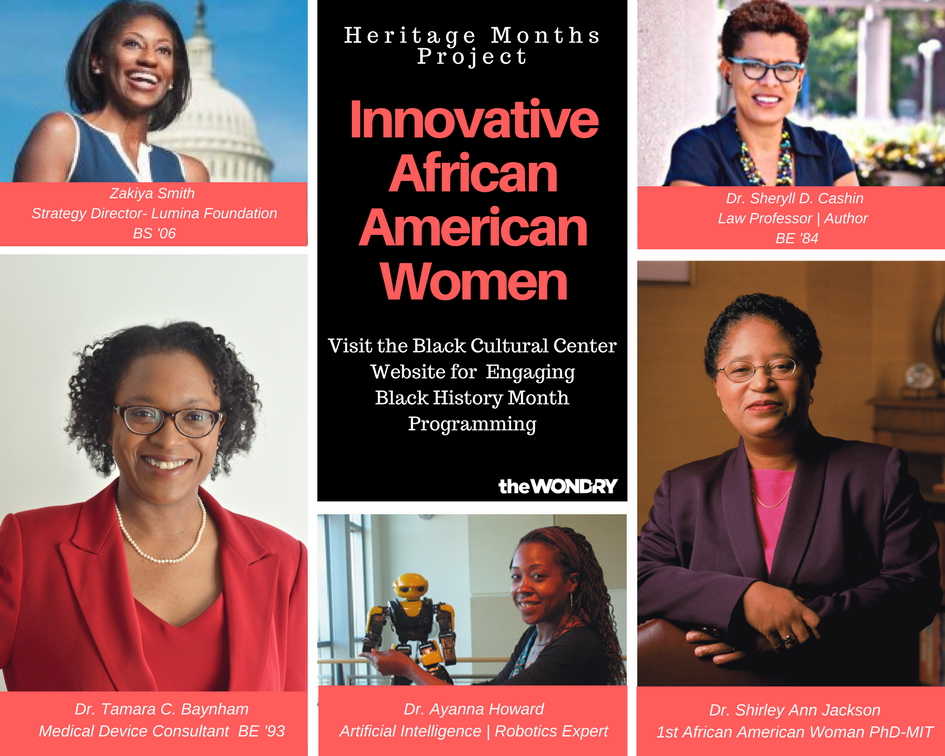February Heritage Month
Twice named one of Forbes’ top 30 under 30 in education, Zakiya is a Strategy Director at the Lumina Foundation, the nation’s largest foundation dedicated solely to higher education. At Lumina, she leads the work of the foundation to develop new models of student financial support for higher education.
A frequent commentator on issues of higher education affordability and access, Smith previously served as a Senior Advisor for Education at the White House Domestic Policy Council, where she was tasked with developing policy in support of President Obama’s higher agenda. Smith also served in the Obama administration as a senior adviser at the U. S. Department of Education working across issue areas spanning across the secondary and post secondary education landscape.
Before her tenure in the Obama administration, Smith was Director of Government Relations at the Advisory Committee on Student Financial Assistance, where she authored reports on college access programs, community colleges, and on the ability of low- and moderate- income families to afford college.
Zakiya has provided insights on higher education policy at dozens of conferences, briefings, and panels across the nation. She has been featured on C-SPAN and Fox Business News as well as profiled in the Chronicle of Higher Education, Forbes Magazine, and Diverse Issues in Higher Education. Passionate about college advising, she is an appointed board member at the National Association for College Admission Counseling (NACAC).
Dr. Smith holds a bachelor’s degree in political science and secondary education from Vanderbilt University, a master’s degree in education policy and management from the Harvard Graduate School of Education, and a doctorate in higher education management from the University of Pennsylvania.
https://www.luminafoundation.org/staff/zakiya-smith
Tamara C. Baynham, Ph.D. has extensive medical device R&D experience. Her expertise includes research and intellectual property development in the areas of electrical stimulation and neuromodulation therapies including applications in cardiovascular and metabolic diseases, pain management and urology. Dr. Baynham currently holds over 30 patents granted by the United States Patent and Trade Organization and European Patent office and has over 20 patents pending. She is also a patent agent registered at the United States Patent and Trade Organization. Dr. Baynham earned a Bachelor of Engineering in Biomedical and Electrical Engineering at Vanderbilt University and an M.S. and Ph.D. in Biomedical Engineering at the University of Alabama at Birmingham.
http://www.tamarabaynhamphd.com/
Dr. Shirley Ann Jackson, a theoretical physicist and famous black inventor, has been credited with making many advances in science. She first developed an interest in science and mathematics during her childhood and conducted experiments and studies, such as those on the eating habits of honeybees. She followed this interest to the Massachusetts Institute of Technology (MIT) where she received a bachelor, and doctoral degree, all in the field of physics. In doing so she became the first African-American woman to earn a Ph.D. from MIT. Jackson conducted successful experiments in theoretical physics and used her knowledge of physics to foster advances in telecommunications research while working at Bell Laboratories. Dr. Jackson conducted breakthrough basic scientific research that enabled others to invent the portable fax, touch tone telephone, solar cells, fiber optic cables, and the technology behind caller ID and call waiting. Currently, Jackson is the president of Rensselaer Polytechnic Institute, the oldest technological research university in the United States, and recently ranked by U.S. News and World Report as one of the nation’s top 50 universities. The mission of Rensselaer since its founding in 1824 has been to “apply science to the common purposes of life.” Dr. Jackson’s goal for Rensselaer is “to achieve prominence in the 21st century as a top-tier world-class technological research university, with global reach and global impact.” http://president.rpi.edu/president-biography
Dr. Ayanna Howard is an educator, researcher, and innovator. Her academic career is highlighted by her focus on technology development for intelligent agents that must interact with and in a human-centered world, as well as on the education and mentoring of students in the engineering and computing fields. Dr. Howard has made significant contributions in the technology areas of artificial intelligence, computer vision, and robotics. Her published research, currently numbering over 200 peer-reviewed publications, has been widely disseminated in international journals and conference proceedings. She has over 20 years of R&D experience covering a number of projects that have been supported by various agencies including: National Science Foundation, Procter and Gamble, NASA, ExxonMobil, Intel, and the Grammy Foundation. She continues to produce novel research and ideas focused on applications that span from assistive robots in the home to therapy gaming apps to remote robotic exploration of extreme environments. By working at NASA before entering the academic world, she brings a unique perspective to the academic environment.
Sheryll Cashin writes about race relations and inequality in America. Her new book, Loving: Interracial Intimacy in America and the Threat to White Supremacy explores the history and future of interracial intimacy, how white supremacy was constructed and how “culturally dexterous” allies may yet kill it. Her book, Place Not Race (Beacon, 2014) was nominated for an NAACP Image Award for Outstanding Non-Fiction in 2015. Her book, The Failures of Integration (PublicAffairs, 2004) was an Editors’ Choice in the New York Times Book Review. Cashin is also a two-time nominee for the Hurston/Wright Legacy Award for non-fiction (2005 and 2009). She has written commentaries for the New York Times, Los Angeles Times, Washington Post, Salon, The Root, and other media.
Cashin is Professor of Law at Georgetown University where she teaches Constitutional Law, and Race and American Law among other subjects. She is Vice Chair of the board of the National Portrait Gallery, and an active member of the Poverty and Race Research Action Council. Cashin worked in the Clinton White House as an advisor on urban and economic policy, particularly concerning community development in inner-city neighborhoods. She was law clerk to U.S. Supreme Court Justice Thurgood Marshall. Cashin was born and raised in Huntsville, Alabama, where her parents were political activists. She currently resides in Washington, D.C., with her husband and two sons.

